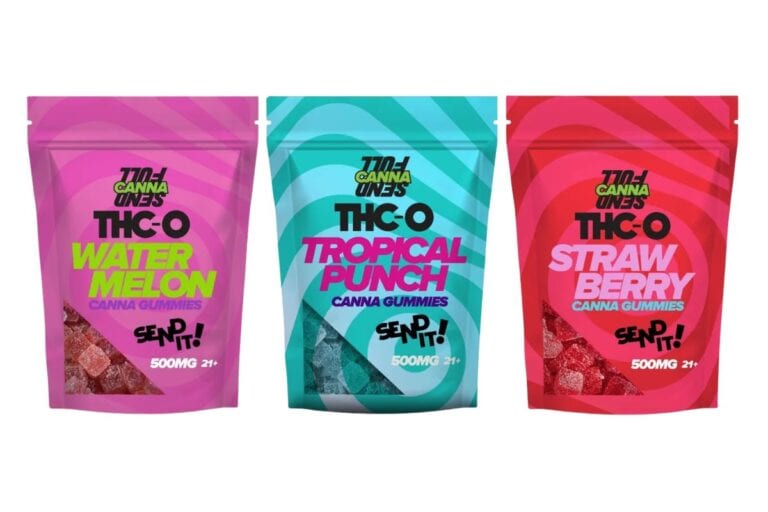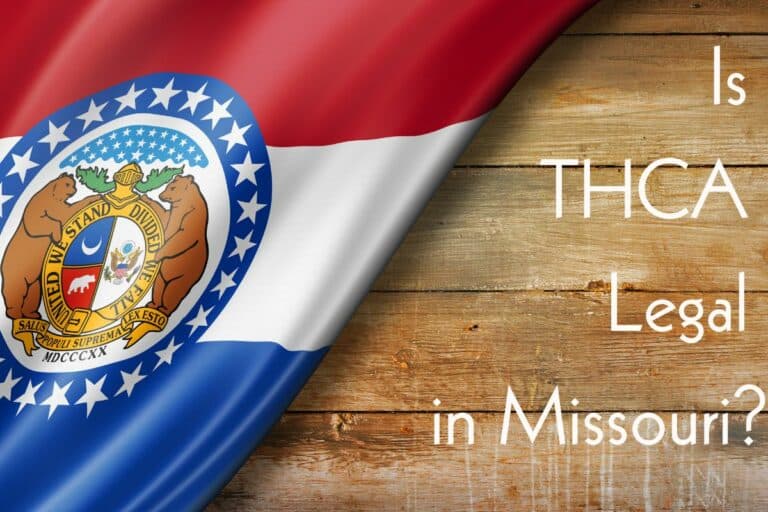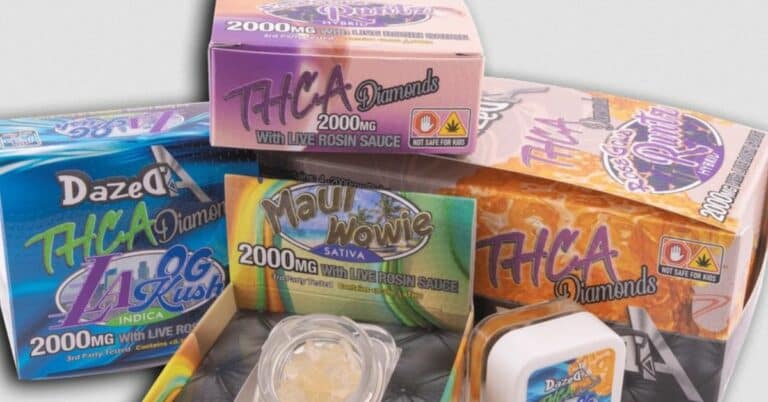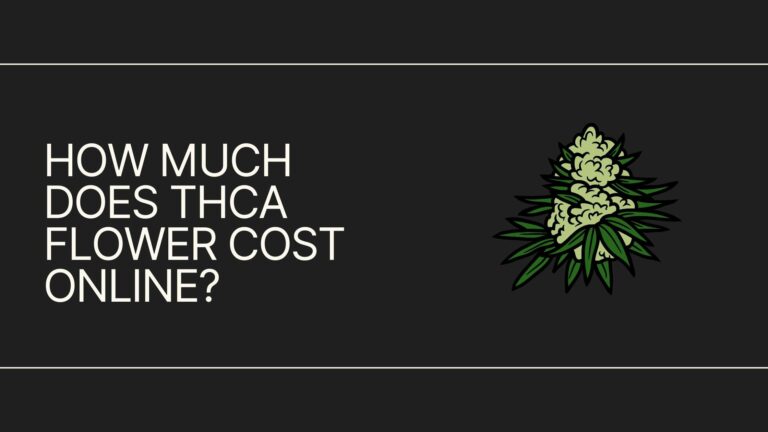Is THCa Legal in Kansas: State Laws Explained
Kansas has some pretty surprising laws on THCa, given the quick shifts in marijuana regulations everywhere else. The Sunflower State holds tight control over marijuana, yet the situation gets intriguing when it comes to THCa. Unlike THC, which sends you on a crazy journey, THCa chills in the plant’s raw parts without playing tricks on your mind.
Your understanding of THCa’s legality hinges on its lack of psychoactive effects, which differentiates it from THC. However, in Kansas, the legal distinction between various cannabinoids can be complex. The state’s regulations continue to be stringent, and while certain types of cannabis products may not be subject to the same restrictions as marijuana, comprehensive legislation around every individual cannabinoid, including THCa, is not always clear-cut.
- Overview of THCa
- Legal Framework for Cannabis in Kansas
- Legality of THCa in Kansas
- Hemp and Hemp-Derived Products
- Beyond Kansas: THCa in Other States
- Potential Benefits and Uses of THCa
- Compliance and Testing
- Role of Third-Party Lab Tests
- Understanding THC Concentration in Products
- Frequently Asked Questions
- What are the regulations surrounding THCa in Kansas?
- Can THCa be legally shipped to Kansas?
- How does THCa's legal status in Kansas compare to that in neighboring states?
- Are there any specific laws in Kansas City regarding THCa?
- What is the difference between THCa and Delta-9 THC in terms of legality?
- Does possession of THCa have potential legal repercussions in Kansas?
Navigating the legalities requires consideration of both state and federal law, since despite individual state legislation, marijuana remains federally illegal. The specifics of Kansas law and its interpretation regarding THCa may influence personal and industrial usage within the state. Therefore, staying informed about Kansas’s legislative stance on cannabis and its derivatives is essential for compliance and understanding your rights in regard to cannabinoids like THCa.
Overview of THCa

In this section, you’ll explore THCa, a cannabinoid in its non-psychoactive acid form, and understand how it differs from its active counterpart, THC.
Understanding THCa
Tetrahydrocannabinolic acid (THCa) is a cannabinoid found naturally in the raw cannabis plant. Unlike Delta-9 THC, the compound widely recognized for its psychoactive properties, THCa is non-psychoactive. This means that it won’t produce the “high” associated with THC. Through a process known as decarboxylation, which typically involves heat, THCa is converted into psychoactive Delta-9 THC. The legal status of THCa can be complicated, as it often hinges on whether the compound is considered active THC upon consumption.
THCa vs. THC
The main difference between THCa and THC is their psychoactive effects. While THCa remains non-psychoactive unless decarboxylated, THC is the psychoactive compound responsible for the mind-altering effects of cannabis consumption. The conversion process can occur through methods such as drying, curing, or heating the cannabis material. The nuances of this relationship are crucial to understanding the legal interpretations of cannabis usage and possession, particularly in places like Kansas, where legalities around cannabis-derived substances can be quite strict.
Legal Framework for Cannabis in Kansas
| Aspect | Details |
|---|---|
| Recreational Use | Completely illegal. Possession is a criminal offense. |
| Medical Marijuana | No legal medical cannabis program exists. Only CBD oil with ≤5% THC is allowed under an affirmative defense (SB 28) |
| CBD-Only Legal Use | CBD oil (≤5% THC) permitted under SB 28 (2019), but users can still face arrest—though defense argued in court. |
| Decriminalization (Local) | Wichita and Lawrence have municipal ordinances reducing penalties for small amounts (e.g., low fines instead of criminal charges), but these conflict with state law. |
| Penalties for Possession | – 1st offense: Class B misdemeanor – up to 6 months jail and $1,000 fine. – 2nd offense: Class A misdemeanor – up to 1 year jail and $2,500 fine. – 3rd+ offense: Level 5 felony – 10–42 months in prison and up to $100,000 fine. |
| Other Criminal Penalties | Sale, distribution, cultivation, and paraphernalia carry severe felony punishments based on quantity. |
| Interstate Legal Cannabis | Possessing cannabis legally purchased in neighboring states (e.g., Colorado or Missouri) is still illegal in Kansas. |
| Federal Classification | Cannabis remains a Schedule I controlled substance under federal law. The DEA is reviewing a possible reclassification to Schedule III, but no changes have taken effect yet. |
| Legislative Activity (2025) | In early 2025, bills were introduced:– Senate Bill 294 proposes a medical marijuana program with licensing & caregivers.– House Bill 2405 would legalize recreational use, create licensing framework, and impose a 15% sales tax. ⎯Still under consideration. |
When you’re navigating the legal landscape regarding cannabis in Kansas, it’s essential to understand state-level regulations, how they compare with federal laws, and the legal distinctions between marijuana and hemp.
State Laws and Regulations
In Kansas, marijuana remains illegal both for recreational and general medical use. However, the Kansas legislature has passed Senate Bill 282, which updated the definition of marijuana to exempt certain medicinal hemp preparations and effectively legalized hemp-derived products containing no more than 0.3% THC. Cannabis with a THC concentration higher than this threshold is still considered a controlled substance in the state.
Comparison with Federal Laws
Federal law, through the 2018 Farm Bill, legalized hemp at the national level, removing it from the list of controlled substances and differentiating it from marijuana based on the same 0.3% THC threshold. Kansas state laws are in alignment with this federal legislation for hemp-derived products, which allows for the possession and sale of hemp products, provided they meet the required THC content standard.
Distinction Between Marijuana and Hemp
In the context of Kansas laws, hemp is characterized by the presence of 0.3% or less THC by dry weight. Products derived from hemp, such as CBD oils with minimal THC content, are legal. On the other hand, marijuana—the cannabis plant with more than 0.3% THC—is not permissible. This bifurcation helps regulate the cannabis market and maintains a clear legal boundary for enforcement and consumer understanding within Kansas.
Legality of THCa in Kansas
In Kansas, your understanding of the legality of THCa is crucial, as it affects possession, cultivation, and potential medical usage within the state.
Current Legal Status
THCa, or tetrahydrocannabinolic acid, is a precursor to THC, the psychoactive compound in cannabis. As of the current date, Kansas has not legalized marijuana for recreational use, and this extends to THCa. Under the federal Controlled Substances Act, THCa is not specifically listed; however, because it is a compound that is inherent to the cannabis plant, it is generally encompassed under cannabis regulations.
Possession, Cultivation, and Distribution
You must be aware that Kansas law prohibits the possession, cultivation, and distribution of substances derived from cannabis, which includes THCa. Being caught with any form of cannabis could result in penalties ranging from fines to imprisonment, depending on the amount and intent demonstrated by your possession or cultivation.
Medical Marijuana and THCa
Kansas has enacted a very restrictive medical marijuana program; however, as of now, it only allows for CBD products with zero THC content. Current laws do not permit THC or its derivatives like THCa for medical use. As a resident of Kansas, you may have recently heard discussions regarding the potential benefits of THCa, especially as a non-psychoactive substance, but it remains within the legal confines of the state’s stringent cannabis regulations.

Hemp and Hemp-Derived Products
Understanding the legal landscape of hemp and hemp-derived products, including their concentration limits and status under law, is crucial in Kansas, as is knowing the specifics of THCa content in hemp flower.
Legal Definition of Hemp
In the United States, including Kansas, hemp is legally defined as the plant Cannabis sativa L. and any part of the plant with a delta-9 THC concentration of less than 0.3% on a dry weight basis. This definition is critical as it differentiates hemp from marijuana, which is federally controlled.
Cannabinoid Concentration Limits
Hemp-derived products can contain cannabinoids, such as CBD and THCa, but must adhere to concentration restrictions. Specifically, the total delta-9 THC content must be less than 0.3%. Products that exceed this threshold are classified differently and subject to stricter regulations.
- Delta-8: Allowed if naturally occurring and within the 0.3% delta-9 THC limit.
- Delta-9 THC: Must be less than 0.3% to maintain hemp classification.
Hemp Flower and THCa
Hemp flower, which naturally contains a variety of cannabinoids including THCa, is legal in Kansas if it complies with the THC limits. THCa, a non-psychoactive acid form of THC, is found in the raw plant. When decarboxylated, THCa converts into THC; however, for the hemp to remain legal, the total delta-9 THC, post-decarboxylation, must not exceed 0.3%.
Beyond Kansas: THCa in Other States
| State | THCa Legal Status in 2022 | Notes |
|---|---|---|
| Kansas | Generally illegal | Kansas has strict cannabis laws. |
| California | Legal for medical and recreational use | California has legalized both medical and recreational cannabis. |
| Colorado | Legal for medical and recreational use | Colorado has legalized both medical and recreational cannabis. |
| Oregon | Legal for medical and recreational use | Oregon has legalized both medical and recreational cannabis. |
| Washington | Legal for medical and recreational use | Washington has legalized both medical and recreational cannabis. |
| Massachusetts | Legal for medical and recreational use | Massachusetts has legalized both medical and recreational cannabis. |
| New York | Legal for medical and recreational use | New York has legalized both medical and recreational cannabis. |
As you explore the legal landscape of THCa across the United States, it’s important to understand the diverse approaches of state laws and the key differences that may impact its legality.
Variations in State Cannabinoid Laws
In the United States, the legal status of THCa, a non-psychoactive cannabinoid found in raw and live cannabis, varies significantly from state to state. While Kansas has its regulations, states such as California and Colorado have established comprehensive legal frameworks allowing for the use of cannabis and its derivatives, including THCa, for both medical and recreational purposes. In contrast, states like Idaho and Wyoming maintain stricter policies, where any possession of cannabis-related products remains illegal.
- Alabama: Adheres to strict medical-only use, limiting THCa availability.
- Alaska: Allows recreational and medical use, making THCa widely accessible.
It’s crucial for you to review specific state statutes, since even within legal states, stipulations regarding THCa concentrations and whether they are combined with other cannabinoids like THC may differ.
Noteworthy State Approaches
Some states, such as Oregon and Washington, have garnered attention for their regulatory models, with a focus on laboratory testing of cannabinoids to ensure consumer safety. This includes the accurate labeling of THCa content in cannabis products. Similarly, Massachusetts has set forth regulations that manage both medical and recreational cannabis, providing clear guidelines on the production, distribution, and sale of cannabis, thus including THCa.
- Michigan: Offers a well-regulated market for cannabis, with explicit rules around THCa.
- Nevada: Among the more permissive states, with a booming recreational cannabis industry that includes a variety of products rich in THCa.
Each state’s laws reflect a balance between consumer protection, public health, and enforcement priorities, ensuring that, even with federal restrictions, states exercise their autonomy in shaping their cannabis policies.

Potential Benefits and Uses of THCa
Tetrahydrocannabinolic acid (THCa) is a non-psychoactive precursor to THC found in raw and live cannabis. As a compound, it holds a promise for a variety of uses which may positively affect your health and well-being.
Therapeutic Potential
THCa has shown potential as a therapeutic agent. Its non-psychoactive nature means you can potentially benefit from its properties without the intoxicating effects associated with THC. The potential benefits of THCa include anti-inflammatory and neuroprotective properties. Research suggests that THCa could help alleviate pain and reduce inflammation, making it a compound of interest for medical marijuana research and development.
Research and Studies
Recent research and studies have been focusing on THCa’s possible anti-proliferative and antispasmodic effects, which could help in the treatment of diseases such as prostate cancer and epilepsy. Moreover, evidence pointing to its role in modulating the immune system underscores THCa’s wider potential in therapeutic applications. Clinical trials and detailed research are underway to fully understand the efficacy and scope of THCa in medical applications.
Compliance and Testing
| Category | Key Points |
|---|---|
| Legal Compliance | • Under U.S. federal law, hemp products must contain ≤0.3% Δ9-THC on a dry weight basis (2018 Farm Bill). • THCa itself is not psychoactive until heated, but it converts to Δ9-THC, so compliance testing usually includes Total THC = Δ9-THC + (THCa × 0.877). |
| State-Level Rules | • States may impose stricter THC limits or ban high-THCa hemp products entirely. • For example, some states require “Total THC” compliance, while others only measure Δ9-THC. |
| Accredited Lab Testing | • Labs must be DEA-registered or state-approved for hemp compliance testing. • Standard methods include High-Performance Liquid Chromatography (HPLC) to measure cannabinoids without decarboxylation. |
| Cannabinoid Profiling | • Testing must quantify levels of THCa, Δ9-THC, CBD, CBG, etc. • Helps determine potency and legal compliance. |
| Contaminant Screening | • Products must be tested for: – Pesticides – Heavy metals (lead, arsenic, cadmium, mercury) – Microbials (E. coli, salmonella, mold, yeast) – Residual solvents (if extracted). |
| Labeling Requirements | • Accurate cannabinoid content (THCa %, Δ9-THC %, CBD %, etc.). • Must reflect “Total THC” value in many jurisdictions. • Mislabeled products can lead to recalls, fines, or loss of license. |
| Batch Tracking & COA | • Each production batch must have a Certificate of Analysis (COA) linked by lot number. • COAs should be accessible to consumers (QR code or website). |
| Shelf-Life & Stability Testing | • THCa can degrade to Δ9-THC naturally over time. • Stability testing ensures compliance throughout product shelf-life. |
| Third-Party Verification | • Independent labs confirm results to avoid bias. • Builds consumer trust and strengthens compliance protection. |
| Audit & Recordkeeping | • Producers must maintain records of lab results, COAs, and shipping documents. • Required for inspections by USDA/state regulators. |
When evaluating the legality of THCa in Kansas, it’s essential to understand the state’s compliance regulations and the role that testing plays in product approval. Here, you’ll learn about the importance of third-party lab tests, as well as how THC concentration is assessed within cannabis products, guiding you towards making informed choices.
Role of Third-Party Lab Tests
In Kansas, third-party lab tests are crucial to ensuring cannabis products meet the rigorous standards set by the regulatory framework.
- These labs analyze cannabis samples to determine not only the concentration of THC but also the presence of other cannabinoids such as delta-10 and HHC.
- A product must pass these tests to ascertain that it complies with Kansas Industrial Hemp regulations.
For details on how this speciation process affects compliance, refer to Farm to final product.
Understanding THC Concentration in Products
You might see “THC” on a label, but there’s more beneath the surface.
- THCa extract itself is non-psychoactive and is not regulated in the same way as THC.
- Concentration matters — The sum of THC and its non-psychoactive counterpart, THCa, is a key metric; products are tested to confirm they’re within the legal limit.
Frequently Asked Questions
Understanding the legalities of THCa in Kansas can be pivotal for both consumers and distributors. The following frequently asked questions address key aspects of THCa regulation in the state.
What are the regulations surrounding THCa in Kansas?
In Kansas, THCa is considered a controlled substance due to its potential to convert to Delta-9 THC, which is illegal in the state. Therefore, possession and distribution of THCa may carry similar penalties to those associated with Delta-9 THC.
Can THCa be legally shipped to Kansas?
Given that THCa is classified alongside Delta-9 THC in Kansas, shipping THCa into the state would likely be illegal and could result in criminal charges, aligning with the state’s strict stance on cannabis-related products.
How does THCa’s legal status in Kansas compare to that in neighboring states?
While some neighboring states have more lenient cannabis laws, Kansas maintains restrictive policies. Unlike in states like Colorado where cannabis is legal, in Kansas, both THCa and Delta-9 THC remain tightly regulated and are not legal for recreational or non-approved medical use.
Are there any specific laws in Kansas City regarding THCa?
Kansas City, within the state of Kansas, adheres to the same state laws regarding controlled substances, which include regulations against THCa. There are no separate municipal laws that would permit the use of THCa in Kansas City.
What is the difference between THCa and Delta-9 THC in terms of legality?
Although THCa is a non-psychoactive precursor to Delta-9 THC, Kansas law does not differentiate between the two regarding legality. Both are prohibited, with THCa having the potential to transform into psychoactive Delta-9 THC upon decarboxylation.
Does possession of THCa have potential legal repercussions in Kansas?
Yes, possession of THCa in Kansas could result in legal repercussions, including fines and imprisonment. This is due to the fact that the state’s laws place THCa in the same category as the psychoactive Delta-9 THC.











